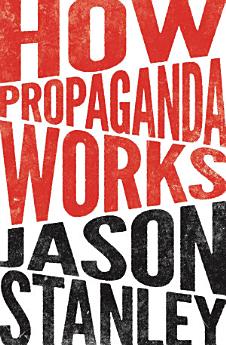How Propaganda Works
२०१५ मे · Princeton University Press
इ-पुस्तक
376
पृष्ठहरू
family_home
योग्य
info
reportरेटिङ र रिभ्यूहरूको पुष्टि गरिएको हुँदैन थप जान्नुहोस्
यो इ-पुस्तकका बारेमा
How propaganda undermines democracy and why we need to pay attention
Our democracy today is fraught with political campaigns, lobbyists, liberal media, and Fox News commentators, all using language to influence the way we think and reason about public issues. Even so, many of us believe that propaganda and manipulation aren't problems for us—not in the way they were for the totalitarian societies of the mid-twentieth century. In How Propaganda Works, Jason Stanley demonstrates that more attention needs to be paid. He examines how propaganda operates subtly, how it undermines democracy—particularly the ideals of democratic deliberation and equality—and how it has damaged democracies of the past.
Focusing on the shortcomings of liberal democratic states, Stanley provides a historically grounded introduction to democratic political theory as a window into the misuse of democratic vocabulary for propaganda's selfish purposes. He lays out historical examples, such as the restructuring of the US public school system at the turn of the twentieth century, to explore how the language of democracy is sometimes used to mask an undemocratic reality. Drawing from a range of sources, including feminist theory, critical race theory, epistemology, formal semantics, educational theory, and social and cognitive psychology, he explains how the manipulative and hypocritical declaration of flawed beliefs and ideologies arises from and perpetuates inequalities in society, such as the racial injustices that commonly occur in the United States.
How Propaganda Works shows that an understanding of propaganda and its mechanisms is essential for the preservation and protection of liberal democracies everywhere.
Our democracy today is fraught with political campaigns, lobbyists, liberal media, and Fox News commentators, all using language to influence the way we think and reason about public issues. Even so, many of us believe that propaganda and manipulation aren't problems for us—not in the way they were for the totalitarian societies of the mid-twentieth century. In How Propaganda Works, Jason Stanley demonstrates that more attention needs to be paid. He examines how propaganda operates subtly, how it undermines democracy—particularly the ideals of democratic deliberation and equality—and how it has damaged democracies of the past.
Focusing on the shortcomings of liberal democratic states, Stanley provides a historically grounded introduction to democratic political theory as a window into the misuse of democratic vocabulary for propaganda's selfish purposes. He lays out historical examples, such as the restructuring of the US public school system at the turn of the twentieth century, to explore how the language of democracy is sometimes used to mask an undemocratic reality. Drawing from a range of sources, including feminist theory, critical race theory, epistemology, formal semantics, educational theory, and social and cognitive psychology, he explains how the manipulative and hypocritical declaration of flawed beliefs and ideologies arises from and perpetuates inequalities in society, such as the racial injustices that commonly occur in the United States.
How Propaganda Works shows that an understanding of propaganda and its mechanisms is essential for the preservation and protection of liberal democracies everywhere.
लेखकको बारेमा
Jason Stanley is the Jacob Urowsky Professor of Philosophy at Yale University. He is the author of Knowledge and Practical Interests, Language in Context, and Know How.
यो इ-पुस्तकको मूल्याङ्कन गर्नुहोस्
हामीलाई आफ्नो धारणा बताउनुहोस्।
जानकारी पढ्दै
स्मार्टफोन तथा ट्याबलेटहरू
Android र iPad/iPhone का लागि Google Play किताब एप को इन्स्टल गर्नुहोस्। यो तपाईंको खातासॅंग स्वतः सिंक हुन्छ र तपाईं अनलाइन वा अफलाइन जहाँ भए पनि अध्ययन गर्न दिन्छ।
ल्यापटप तथा कम्प्युटरहरू
तपाईं Google Play मा खरिद गरिएको अडियोबुक आफ्नो कम्प्युटरको वेब ब्राउजर प्रयोग गरेर सुन्न सक्नुहुन्छ।
eReaders र अन्य उपकरणहरू
Kobo eReaders जस्ता e-ink डिभाइसहरूमा फाइल पढ्न तपाईंले फाइल डाउनलोड गरेर उक्त फाइल आफ्नो डिभाइसमा ट्रान्स्फर गर्नु पर्ने हुन्छ। ती फाइलहरू पढ्न मिल्ने इबुक रिडरहरूमा ती फाइलहरू ट्रान्स्फर गर्नेसम्बन्धी विस्तृत निर्देशनहरू प्राप्त गर्न मद्दत केन्द्र मा जानुहोस्।






